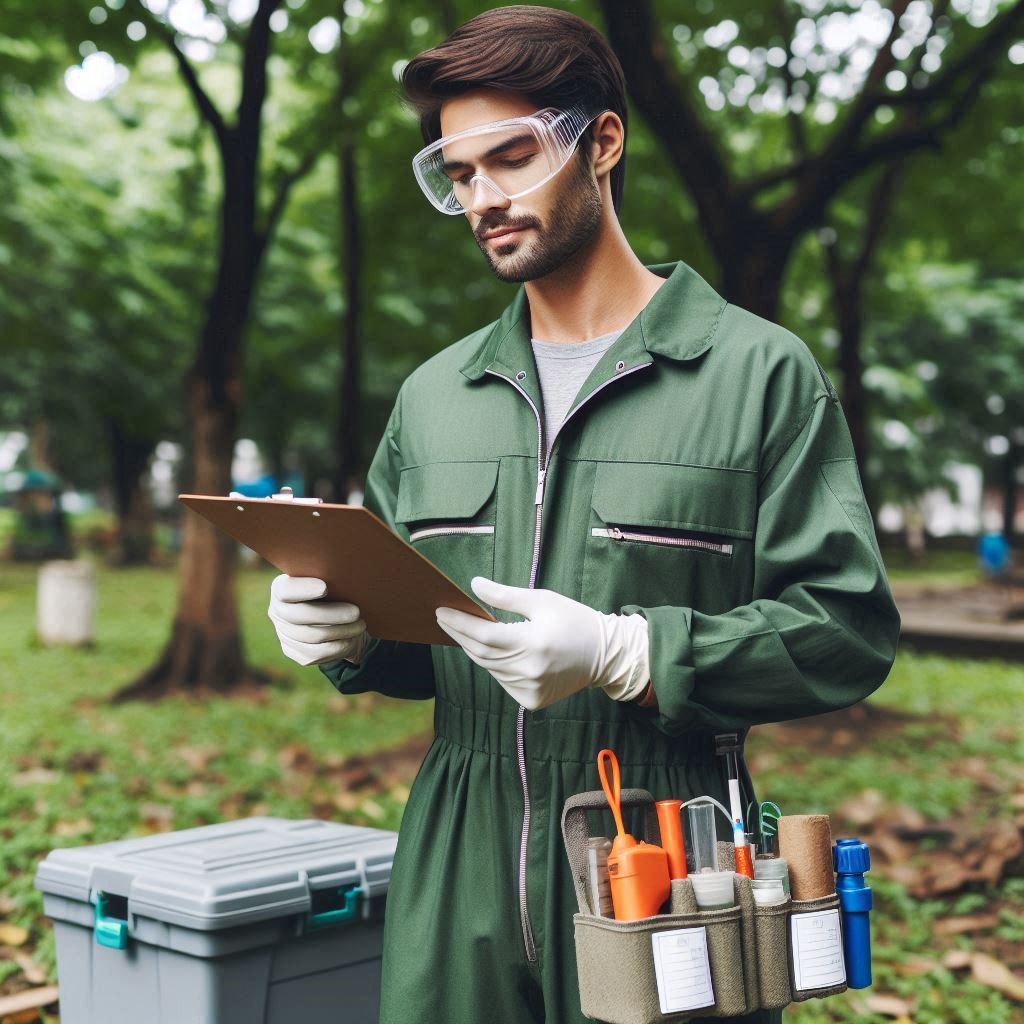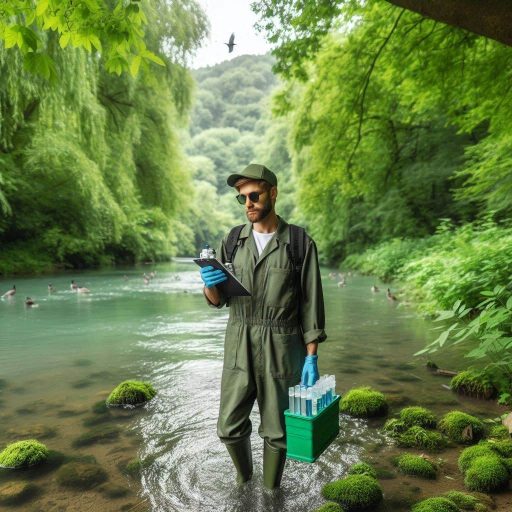Introduction
Environmental technicians play a crucial role in managing hazardous waste, ensuring both public health and environmental protection for environmental Technicians in Hazardous Waste Management.
They monitor, sample, and analyze waste to prevent contamination, safeguarding ecosystems and communities.
By assessing waste treatment and disposal methods, they help minimize environmental damage and promote sustainability.
Hazardous waste management is vital for preventing toxic substances from polluting air, water, and soil.
Environmental technicians identify and mitigate risks associated with chemical, biological, and radioactive waste, reducing potential harm.
Their expertise is essential in maintaining compliance with environmental regulations, preventing legal penalties, and promoting corporate responsibility.
Proper hazardous waste management also supports resource conservation and waste reduction efforts.
Environmental technicians assist in recycling and reusing materials, reducing the need for new raw resources.
This not only conserves natural resources but also decreases the environmental footprint of industrial activities.
In emergencies, environmental technicians respond quickly to contain and remediate hazardous spills, protecting both people and wildlife.
Their swift actions prevent long-term environmental damage and costly cleanups.
They also educate communities and industries on safe waste handling practices, promoting a culture of environmental stewardship.
The role of environmental technicians is expanding as industries increasingly recognize the importance of sustainable practices.
Responsibilities of Environmental Technicians
Environmental technicians play a crucial role in protecting public health and the environment.
Their responsibilities revolve around monitoring and testing air, water, and soil quality, identifying hazardous waste, and developing effective waste management plans.
These tasks require precision, dedication, and a strong commitment to safety and sustainability.
Monitoring and Testing Air, Water, and Soil Quality
Environmental technicians are responsible for monitoring and testing the quality of air, water, and soil.
They use specialized instruments to collect samples from various environments.
These samples undergo rigorous testing to determine contamination levels.
By analyzing the data, they identify potential hazards that could impact human health and the environment.
This process is crucial for ensuring that communities remain safe from harmful pollutants.
Air quality monitoring involves measuring pollutant levels like carbon monoxide, sulfur dioxide, and particulate matter.
Environmental technicians ensure that air quality meets legal standards.
If pollutant levels exceed safety limits, they promptly notify authorities and recommend corrective actions.
In water quality testing, technicians examine sources such as rivers, lakes, and groundwater.
They check for contaminants like heavy metals, bacteria, and industrial chemicals.
Regular testing helps to detect pollution early, preventing it from spreading and causing more significant harm.
Soil testing is equally vital in identifying hazardous substances like pesticides, heavy metals, and petroleum products.
Contaminated soil can harm plant life and enter the food chain, posing risks to human and animal health.
By identifying these contaminants, environmental technicians contribute to safeguarding ecosystems and public health.
Identifying and Assessing Hazardous Waste
Environmental technicians also identify and assess hazardous waste.
They determine the type and extent of contamination, which is essential for deciding how to handle the waste.
This process involves detailed site assessments, including visual inspections, sampling, and laboratory analysis.
By identifying hazardous waste accurately, technicians ensure that appropriate measures are taken to mitigate risks.
Their assessments are critical for classifying waste, determining disposal methods, and ensuring compliance with environmental regulations.
Developing and Implementing Waste Management Plans
Once hazardous waste is identified, environmental technicians play a pivotal role in developing and implementing waste management plans.
These plans are designed to minimize environmental impact and protect public health.
They outline the procedures for safely handling, storing, and disposing of hazardous waste.
Technicians collaborate with engineers, scientists, and regulatory agencies to create these plans.
They consider factors like waste characteristics, potential hazards, and legal requirements.
Implementation involves overseeing the safe transportation, treatment, and disposal of hazardous materials.
Environmental technicians also monitor the effectiveness of waste management plans, making adjustments as necessary.
Their continuous efforts ensure that hazardous waste is managed responsibly, reducing environmental damage and promoting sustainability.
Environmental technicians are essential in hazardous waste management.
Their expertise in monitoring, identifying, and managing hazardous waste protects our environment and health.
Read: CAD Technician vs. Draftsman: Key Differences
Role in Hazardous Waste Cleanup
Participating in Cleanup Operations
Environmental technicians play a critical role in hazardous waste cleanup operations.
They are on the front lines, assessing contamination sites and determining the extent of pollution.
Technicians collect soil, water, and air samples to identify hazardous substances.
They use this data to develop effective cleanup strategies, ensuring that all hazardous materials are handled safely.
By actively participating in cleanup operations, environmental technicians help to mitigate environmental damage and prevent further contamination.
Technicians are trained to operate specialized equipment during these operations.
They may use heavy machinery to remove contaminated soil or pumps to extract polluted water.
In addition to physical labor, they maintain detailed records of the cleanup process, ensuring transparency and accountability.
These records are vital for regulatory compliance and future reference.
Ensuring Proper Disposal of Hazardous Materials
Proper disposal of hazardous materials is crucial in protecting the environment and public health.
Environmental technicians ensure that all hazardous wastes are correctly identified, labeled, and transported to designated disposal facilities.
They follow strict protocols to prevent accidental spills or leaks during transportation.
Technicians often work closely with waste management companies, verifying that all disposal methods meet legal and environmental standards.
Environmental technicians also oversee the treatment of hazardous waste.
They monitor processes that neutralize harmful chemicals, making them safe for disposal.
By ensuring proper disposal, technicians prevent hazardous substances from contaminating soil, water, and air.
This proactive approach is essential for preventing long-term environmental damage.
Protecting the Environment and Public Health
The primary goal of environmental technicians is to protect the environment and public health.
They achieve this by reducing the risks associated with hazardous waste.
Through their work in cleanup operations and waste disposal, technicians help prevent exposure to toxic substances.
This is particularly important in communities near industrial sites, where the risk of contamination is higher.
Environmental technicians conduct regular inspections of hazardous waste sites, ensuring that safety protocols are followed.
They also educate the public on the dangers of hazardous materials and the importance of proper disposal.
Public awareness campaigns led by technicians play a vital role in preventing illegal dumping and other harmful practices.
In addition to their hands-on work, environmental technicians contribute to policy development.
Their on-the-ground experience provides valuable insights for creating effective environmental regulations.
By advocating for stricter waste management policies, technicians help to protect the environment and public health on a larger scale.
Read: CAD Technician Certification: What You Need to Know
Importance of Compliance with Regulations
Environmental technicians play a crucial role in hazardous waste management by ensuring compliance with regulations.
Understanding and following regulations is essential to minimize risks and prevent environmental damage.
Let’s explore the significance of compliance with local, state, and federal laws in more detail:
Understanding and Following Regulations
Environmental technicians are responsible for understanding and following regulations related to hazardous waste management.
These regulations provide guidelines on how to handle, transport, and dispose of hazardous materials safely.
By adhering to these regulations, environmental technicians help prevent accidents and protect the environment from harmful contamination.
Ensuring Compliance with Local, State, and Federal Laws
Compliance with local, state, and federal laws is crucial in hazardous waste management.
Each jurisdiction has its own set of regulations governing the handling and disposal of hazardous materials.
Environmental technicians must stay informed about these laws and ensure that their operations comply with all applicable regulations.
Failing to comply with regulations can result in fines, legal action, and damage to the environment.
Minimizing Risks and Preventing Environmental Damage
By complying with regulations, environmental technicians help minimize risks and prevent environmental damage.
Hazardous waste poses serious threats to human health and the environment if mishandled.
Adhering to regulations ensures that hazardous materials are handled safely and disposed of properly, reducing the likelihood of accidents, spills, and contamination.
Compliance with regulations is essential to protect both the environment and public health.
Compliance with regulations is a critical aspect of hazardous waste management.
Environmental technicians play a key role in ensuring that all operations are conducted in accordance with local, state, and federal laws.
By following regulations, environmental technicians help minimize risks, prevent environmental damage, and safeguard human health.
It is essential for environmental technicians to prioritize compliance with regulations to effectively manage hazardous waste and protect the environment.
Read: Essential Skills for CAD Technicians

Training and Education Requirements for Environmental Technicians
Certification and Licensing
Environmental technicians play a crucial role in hazardous waste management, ensuring compliance with strict regulatory standards.
Obtaining certification is essential for validating their expertise and commitment to safety.
Most technicians pursue certifications such as the HAZWOPER (Hazardous Waste Operations and Emergency Response) certification, which is mandated by OSHA for those handling hazardous substances.
This certification involves comprehensive training on hazardous material handling, emergency response, and safety procedures.
State-specific licenses are often required for certain hazardous waste management tasks.
For example, some states mandate a specific license for asbestos removal or lead abatement.
Achieving these credentials involves passing rigorous exams that test both theoretical knowledge and practical skills.
Maintaining these certifications and licenses requires staying updated on industry changes and regulatory updates.
Employers often seek certified technicians as it ensures compliance with environmental regulations, reduces liability, and fosters a culture of safety.
Certification and licensing are not just about legal compliance; they also demonstrate a technician’s dedication to professional growth and responsibility.
Ongoing Professional Development
The field of hazardous waste management is dynamic, with regulations and technologies continually evolving.
To remain effective, environmental technicians must engage in ongoing professional development.
This includes attending workshops, conferences, and seminars focused on the latest industry trends, safety practices, and regulatory changes.
Continuing education is often necessary for maintaining certifications and licenses.
For example, HAZWOPER certification requires annual refresher courses.
These courses ensure that technicians remain proficient in handling hazardous materials and responding to emergencies.
Additionally, specialized training may be needed for emerging technologies in waste management, such as advanced recycling techniques or new remediation technologies.
Networking with other professionals in the field through industry associations can also enhance a technician’s knowledge and career prospects.
Active participation in these networks fosters the exchange of ideas and best practices, helping technicians stay at the forefront of their field.
Skills Needed for Success in the Field
Success in hazardous waste management requires a blend of technical skills, analytical abilities, and personal attributes.
Strong knowledge of environmental science and chemistry is crucial, as technicians must understand the properties of hazardous materials and how they interact with the environment.
Technical proficiency in using specialized equipment for waste handling, testing, and remediation is also essential.
Critical thinking and problem-solving skills are vital for assessing complex situations and determining the safest and most effective solutions.
Communication skills are equally important, as technicians must clearly convey safety procedures, regulatory requirements, and risk assessments to both colleagues and clients.
Attention to detail is paramount in this field, where even small oversights can lead to significant safety hazards.
A commitment to safety and a proactive approach to risk management are key attributes for any environmental technician.
Embracing continuous learning and adaptability will help technicians excel in this ever-evolving industry.
Read: Day in the Life of a CAD Technician
Transform Your Career Today
Unlock a personalized career strategy that drives real results. Get tailored advice and a roadmap designed just for you.
Start NowCollaboration with Other Professionals
Collaborating with Engineers, Scientists, and Regulators
Environmental technicians play a vital role in managing hazardous waste.
They work closely with engineers, scientists, and regulators.
Together, they ensure hazardous waste is handled safely and effectively.
The collaboration between these professionals is essential to protect public health and the environment.
Environmental technicians collect and analyze data from various sites.
They then share this information with engineers and scientists.
This data helps these experts design effective waste management strategies.
Engineers rely on this data to create systems that safely store, treat, and dispose of hazardous waste.
Scientists, on the other hand, use the data to assess potential risks.
They evaluate the impact of hazardous waste on the environment and human health.
Environmental technicians must communicate their findings clearly and accurately.
Any errors or omissions can lead to ineffective or dangerous outcomes.
Therefore, precise and clear communication is critical.
Communicating Findings and Recommendations
Environmental technicians are responsible for communicating their findings to all relevant parties.
This includes engineers, scientists, and regulatory authorities.
They must present data in a way that is both accurate and easy to understand.
When technicians identify potential hazards, they must promptly report these findings.
They provide recommendations on how to mitigate risks.
This could involve suggesting changes to current practices or introducing new safety measures.
Their recommendations help ensure that hazardous waste is managed in compliance with regulations.
Environmental technicians must also stay up-to-date with changes in regulations.
They need to ensure that their findings and recommendations align with current laws.
Effective communication with regulators is crucial in this regard.
Technicians often serve as a bridge between the on-the-ground realities and regulatory expectations.
This role requires both technical knowledge and communication skills.
Coordinating Efforts to Address Hazardous Waste Issues
Coordination is key in hazardous waste management.
Environmental technicians often act as coordinators among various stakeholders.
They ensure that engineers, scientists, and regulators are all working towards the same goals.
Technicians organize meetings and facilitate discussions.
They make sure everyone is informed about the latest findings and developments.
By coordinating efforts, they help streamline the decision-making process.
This ensures that actions taken are timely and effective.
Technicians also play a role in training and educating other team members.
They share best practices and ensure that everyone understands their roles in managing hazardous waste.
This collective effort helps prevent environmental contamination and protects public health.
Challenges and Opportunities in Hazardous Waste Management
Dealing with Complex Waste Streams
Environmental technicians play a crucial role in managing complex waste streams.
They identify, classify, and handle hazardous materials safely.
As industrial processes grow more intricate, so do the types of waste they produce.
Environmental technicians are trained to manage these complexities with precision and care.
Innovative waste treatment technologies, such as bioremediation and advanced filtration systems, have become essential tools.
These innovations enable technicians to treat a wider variety of hazardous wastes effectively.
Environmental technicians are at the forefront of implementing these technologies, ensuring they are used correctly and efficiently.
Innovations in Waste Treatment and Disposal
The field of hazardous waste management constantly evolves, driven by environmental regulations and technological advancements.
Environmental technicians must stay updated on the latest waste treatment and disposal innovations.
These innovations often involve cutting-edge technologies like thermal desorption and chemical oxidation.
Environmental technicians operate and maintain these systems, ensuring compliance with environmental standards.
They work closely with engineers and scientists to optimize waste treatment processes, making them safer and more efficient.
Their expertise ensures that hazardous waste is treated in ways that minimize environmental impact.
Emerging technologies also offer new methods for dealing with previously untreatable wastes.
For example, plasma arc technology can break down hazardous waste into harmless components.
Environmental technicians are trained to operate these advanced systems, making them indispensable in the fight against pollution.
Career Growth and Advancement Opportunities
The field of hazardous waste management offers numerous career growth opportunities for environmental technicians.
With experience, technicians can advance to supervisory or managerial roles.
These positions involve overseeing waste management operations, ensuring that safety and environmental standards are met.
Specialization is another path to career advancement.
Environmental technicians can focus on specific waste streams, such as electronic or pharmaceutical waste.
Specialization requires additional training and certification, but it can lead to higher-paying positions and greater job security.
Continuous learning is essential in this field.
Technicians who pursue advanced certifications, such as the Certified Hazardous Materials Manager (CHMM) designation, often see significant career benefits.
These certifications demonstrate a high level of expertise and commitment to the profession.
Environmental technicians who embrace innovation and adaptability are particularly well-positioned for career growth.
The ability to work with new technologies and complex waste streams makes them valuable assets to any organization.
As environmental regulations tighten and waste management becomes more complex, the demand for skilled technicians will continue to rise.
Conclusion
Environmental technicians play a crucial role in hazardous waste management.
They protect ecosystems by preventing hazardous waste contamination.
These skilled professionals monitor, manage, and ensure proper disposal of harmful substances.
Their work directly impacts public health, safeguarding communities from the dangers of toxic materials.
They also ensure compliance with environmental regulations, helping businesses avoid penalties and reduce their environmental footprint.
For those passionate about the environment, a career in environmental technology offers an opportunity to make a meaningful impact.
By becoming an environmental technician, you can contribute to preserving our planet and protecting human health.
This field is dynamic, with advancements in technology and regulations creating ongoing demand for skilled professionals.
Environmental technicians work across various industries, including manufacturing, waste management, and government agencies, offering diverse career paths.
The role combines hands-on fieldwork with analytical tasks, making it an ideal choice for those who enjoy both technical and practical challenges.
Pursuing a career in environmental technology not only provides job security but also offers the satisfaction of knowing your work benefits society.
As environmental concerns continue to grow, the need for dedicated professionals in hazardous waste management becomes increasingly critical.
If you’re considering a career in environmental technology, now is the time to act.




